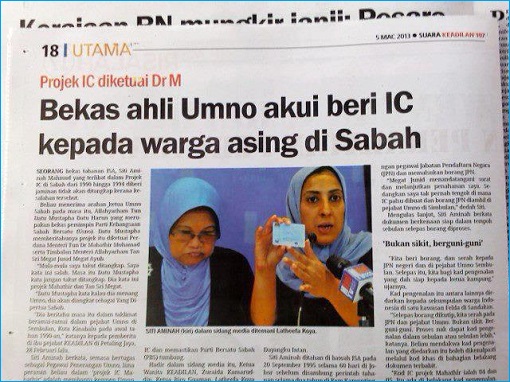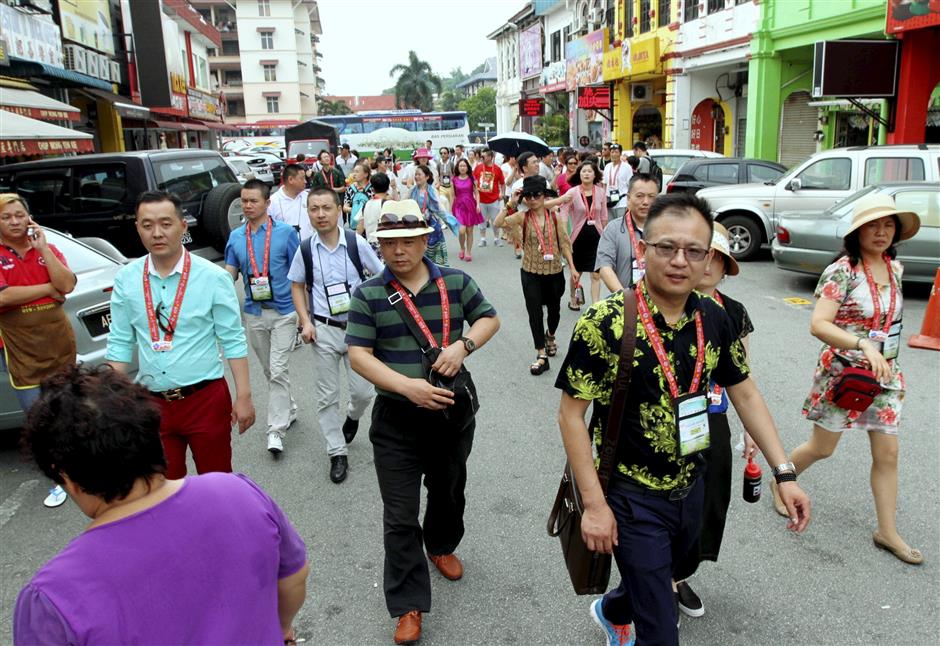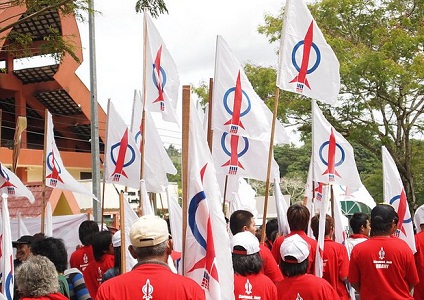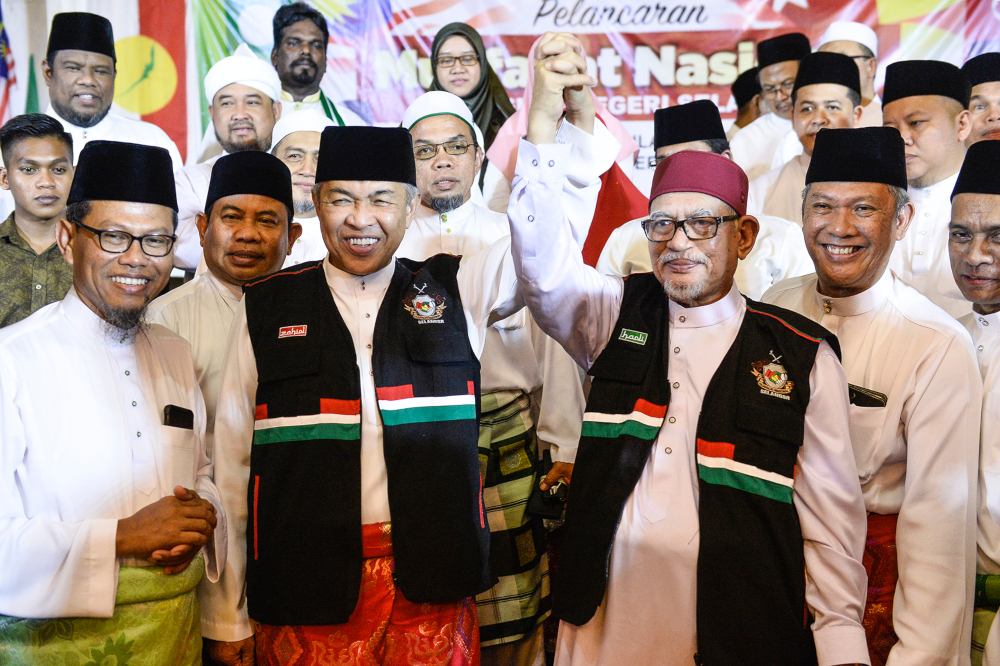DAP’s plan to turn Malaysia into Cinasia

This is one of the reasons why the Malays have done a U-turn and now reject the DAP-led Pakatan Harapan. In just 21-22 months the Malays have seen how DAP has tried to undermine the Malays and weaken Malay political power. The Malays now realise that DAP’s agenda is not better-governance, as they claim, but to turn Malaysia into Cinasia.
NO HOLDS BARRED
Raja Petra Kamarudin
Today, according to unofficial estimates, up to six million foreign workers are in Malaysia, or 18.6 per cent of the country’s 32.6 million population. This expatriate labour force is made up of 2.3 million legal workers and another 3.7 million illegal workers.
Without these six million foreign workers, Malaysia’s economy would come to a standstill. And this matter was raised by Murray Hunter in his article “Malaysia’s massive foreign worker dependency,” which was published in The Malay Mail Online on 27th November 2019 (READ THE ARTICLE HERE).
“Foreign workers represent somewhere between 31-40 per cent of the total Malaysian workforce of 15.3 million, employed primarily in what is called “3D” (dirty, dangerous, and difficult) jobs in the plantation, agriculture, construction, manufacturing, and service sectors,” wrote Murray Hunter.
One matter that is never discussed, and which Bank Negara Malaysia somehow does not wish to talk about, is the billions in foreign exchange that Malaysia loses every month because these six million foreign workers are sending money back to their homeland. And this is not only a current problem but has been going on for decades. And the “black money” market is even worse and is seriously hurting the Ringgit.
This is not only a problem for Malaysia. Many rich countries surrounded by poorer countries all over the world face the same dilemma and this was one of the reasons why the British voted for Brexit. And this is also why Singapore is now the worst hit South East Asian country despite all its efforts to combat the Covid-19 coronavirus pandemic.
Again, Singapore’s losing battle against Covd-19 is because of the guest workers or foreign labour force.

The RCI on Projek M has established the truth regarding Mahathir’s role in this scandal
Tun Dr Mahathir Mohamad’s Pakatan Harapan failed to win the election in Sabah in GE14 mainly because of Projek M or Project IC, the very controversial citizenship-for-foreigners issue. Sabahans just did not want to have anything to do with the person who inflated Sabah’s population with 1.5 foreigners by giving them “backdoor” citizenship. (READ: Projek M in the 1980s resulted in 1.5 million immigrants into Sabah).
South China Morning Post’s special report of 25th March 2017 (which you can read below) has triggered alarm bells amongst the Malays. There is an effort being made by DAP and backed by Chinese billionaires based in Malaysia as well as overseas to bring in one million people from China and give them Malaysian citizenship.

READ: More JPN officers to be nabbed in IC-for-Chinese scandal
Mahathir, in fact, had raised this alarm back in 2013 when he alerted the Malays about Chinese nationals coming into Malaysia to get citizenship. Mahathir spoke about colonisation and how the Malays are going to lose their country to foreigners and become hamba di negara sendiri.
This is one of the reasons why the Malays have done a U-turn and now reject the DAP-led Pakatan Harapan. In just 21-22 months the Malays have seen how DAP has tried to undermine the Malays and weaken Malay political power. The Malays now realise that DAP’s agenda is not better-governance, as they claim, but to turn Malaysia into Cinasia.
************************************************************************
Why are Chinese moving to Malaysia by the thousands?
With an election looming, the country’s often fraught race relations are as complicated as ever, but that hasn’t dented its appeal to a ‘third wave’ of immigrants from China
Tashny Sukumaran and Coco Liu, SCMP, 25 March 2017
Paul Ying Qian, 32, first tried durian when he was 10 years old in his home town of Hunan ( 湖南 ), China. A family friend had sent his mother the pungent fruit, which the whole family enjoyed. Paul tried durian again when he was studying in Australia, but it was expensive and didn’t match the taste in his memory.
Now he lives in durian-obsessed Malaysia, but it isn’t the fruit that brought him here. It was the temperate weather, cleaner air and mix of Asian values and Western infrastructure. “It’s easy to join in the culture here, and not feel like a total outsider. The different races get on well, and it’s quite near China – much nearer than Australia. The education is good, and the country maintains its traditional face while also experiencing development. Back home the seasons are very dramatic with extremely hot summers and very cold winters. Malaysians are very friendly. I feel this is a good place for my next generation.”
READ: Umno delegate makes veiled claims that DAP sold IC to Chinese nationals
Paul, who gained his residency through the Malaysia My Second Home (MM2H) programme, is one of thousands who have settled under the scheme. He has been here since 2009, and his two children, aged one and three, were born in Malaysia.
“I travel between here and China, spending about four months a year in my home town Wuhan (武漢) to take care of the family business. My wife Sophy stays in Malaysia with the kids,” he said.
He discovered Malaysia thanks to his father, who travelled the region in his youth.

There is an organised effort to bring Chinese nationals into Malaysia and give them Malaysian citizenship
“He went to Singapore, Thailand, Malaysia. He liked it best and moved here when he was older. After I completed my undergraduate degree in Australia, I came here to do an MBA and stayed on. My parents actually live in the same building as me,” he said, pointing to the tall tower behind him ensconced in the leafy upmarket suburb of Mont Kiara, Kuala Lumpur.
Paul and his family are comfortable in the nation’s capital, even with MM2H’s no-work clause. His real estate and wholesale business dealings in China allow him to support his family, while he has also invested in the Malaysian hotel industry. And in his spare time he and his family go on road trips, travelling to hawker haven Penang or idyllic Langkawi just because they can.
Although Malaysia has a history of mistreating migrants, particularly refugees and foreign workers, those under the MM2H scheme are considered “expats”, an elite, high-earning group.
The scheme allows successful applicants largely unrestricted travel into and out of Malaysia as well as various incentives and tax exemptions. However, it comes with stringent eligibility criteria as well: liquid assets of 350,000 Malaysian ringgit (HK$615,000) to 500,000 ringgit, fixed deposits and a minimum price cap on purchasing property so as to curb speculation.
In 2016, more than 1,000 Chinese signed up for the scheme, fleeing the freezing cold winters and dangerous pollution levels of their homeland – 43.9 per cent of applicants were Chinese, with Japanese a distant second at 9.2 per cent.
Chinese have shown the most interest in the scheme. Official government statistics put the number of successful Chinese applicants at 7,967 from 2002 to 2016, out of a total of 31,732 successful applicants from around the world – 25.1 per cent of the share.

Penang is the favourite destination for Chinese nationals seeking a second home in Malaysia
Malaysia is experiencing a “third wave” of Chinese migration – after a 15th century influx and a tin mining boom in the 19th century – these days that isn’t at all limited to just MM2H participants, but also includes foreign workers, some of whom are undocumented. A fair number of these migrant workers are usually employed in low-skilled sectors such as construction or factory lines. Recently, 127 Chinese nationals were rounded up by the Sarawak Immigration Department and 16 of them lacked valid travel documents.
This influx of Chinese migration comes at a time when Malaysia’s often fraught race relations are more complicated than ever, with a general election – always a good time for race to be made a political football – looming. In 2015, a pro-Malay protest with anti-Chinese sentiments drew the ire of Ambassador Huang Huikang, who said China would not ignore “infringement on China’s national interests or violations of legal rights and interests of Chinese citizens and businesses”, reported the media.
However, MM2H applicants brush aside such concerns, reporting friendliness from the Malaysians they meet. Since many divide time between China, where they deal with business obligations, and Malaysia, any concerns about racial tensions are lessened as they have someplace else to go.
Hu Xiaolong, 65, moved to Malaysia from Shanghai to be closer to his daughter after she married a Malaysian. Before he became part of the MM2H programme, he could not stay for longer than a month.
“I now spend a few months in Shanghai and a few months in Malaysia visiting my daughter. I found Malaysia a nice place for the elderly, so my wife and I bought an apartment in Kuala Lumpur,” he said.
“Kuala Lumpur is nicely developed and everything is still quite cheap. Much cheaper than Shanghai. I have travelled to over 30 countries and I think Malaysia is a good fit for me. Chinese can live harmoniously with Malays and Indians here. There is no conflict among different ethnic groups.”
The only problem, he says, is when his wife tries to order food with her limited command of English. “But that’s why she usually goes for buffets,” he noted wryly.

They first come as tourists and then end up as voters
Hu said he had urged friends to sell their properties in China and move to Malaysia.
“I told a friend that if he sells his apartment in Shanghai, he can buy a luxury home in Kuala Lumpur and still have some money left. My friend refused, saying that his social circle is still in China. But some friends are considering the second home scheme and they want to come here to have a look.”
Hu Yiqing, 48, fell in love with the sea when she visited her aunt in the island state of Penang. “You could see the sea from her home. We are from Shanghai and it’s rare to have a sea-view apartment in Shanghai. She told us about the scheme so once we went back to China, we immediately started applying … We filed all the papers in May and by August we relocated to Penang.”
Penang’s laid-back vibe appealed to homemaker Hu and her husband, who runs a financial services company. They do not miss the bad traffic and poor air quality in Shanghai.
She said her husband split his time between Penang and Shanghai. “If we had a better internet connection my husband would stay the whole year. But even now, we still don’t want to go back to China,” she said, adding that the pair and their son integrated into local life quickly due to the high number of Chinese-speaking Malaysians in Penang.
“There are so many Chinese that you can integrate into the society easily. My friends are from Chinese parents in international schools or Chinese from local churches.”
Hu said her son could go to an international school for half the price of Shanghai. “The education quality is pretty much the same – in fact, I like the international school in Penang better. In Shanghai, even if you study in an international school, kids are still being pushed by teachers to study hard and compete with each other. I disagree with their way of teaching.”
She has praised the scheme to her friends, many of whom are now applying.
“So many Chinese have been coming to Penang. It’s hard for children to enrol in an international school now. They are all packed.”
Retiree Maurice Choy, 55, left Hong Kong for Malaysia because of its weather and reasonable cost of living. Fishing, swimming and badminton are on his list of priorities.
“I travelled to Malaysia many times over the last 20 years for work and holiday, and I found Penang a nice place to retire. I bought an apartment there several years ago and applied for the scheme. This month I will settle permanently in Malaysia with my wife.
“Malaysia is much more affordable than Hong Kong. It’s easy for us to have a high-quality life with our pension. The weather is good, too. I actually migrated to Canada 10 years ago but had to come back because I’m not used to cold weather. The weather in Penang is good the whole year round.”
Despite Malaysia’s tendencies towards xenophobia and its sometimes strained race relations – balik Cina (go back to China) and apa lagi Cina mau (what more do the Chinese want) are slurs sometimes hurled at the Malaysian-Chinese community – these migrants appear shielded from it all or have not encountered such unpleasantness. Many MM2H participants have praised Malaysia for its friendliness.
However, some Malaysians wonder how the country benefits from the programme. “In terms of cultural impact, it honestly depends on how the incoming Chinese population behave in a social setting. There won’t be a large economic impact unless a huge number come in with enough capital to invest in business,” said Hafidz Baharom, 34, the former communications head for the Malay Economic Action Council.

DAP knows that the Chinese population is shrinking and in 20-30 years or so the Chinese vote would be insignificant
Accountant Tarsem Singh, 31, said that because MM2H minimum property thresholds were high, most programme applicants would only be able to buy homes that were out of the reach for most Malaysians. The minimums include 2 million Malaysian ringgit in Selangor and 1 million Malaysian ringgit in Kuala Lumpur. In Penang , on the island it is 1 million Malaysian ringgit for a condominium and 3 million Malaysian ringgit for landed properties.
“I am not sure how we benefit, other than property developers who get to sell their expensive homes,” Singh said, adding that immigration priorities should focus on young and skilled migrants to stimulate wealth creation and prevent brain drain. This was echoed by independent analyst Khoo Kay Peng: “Most who come here are retirees or run smaller businesses. The high net worth individuals prefer the US or Australia and other OECD [Organisation for Economic Cooperation and Development] countries.”
While MM2H is a good programme, lawyer Ong Yu Jian, 35, said that it needs to be kept in check with policies that limit artificial growth. His home state, Penang, recently raised the minimum price cap for foreigners purchasing property.
“In the short term, it boosts growth and makes the numbers on any economic paper look good. But the potential long-term trade-off may be the displacement of our own locals in terms of economic footholds and nation-building. If the Chinese do so, it may cause resentment and heightened tensions,” he said.
Malaysian Chinese Association Youth Chief Chong Sin Woon, however, dismissed the possibility of racial tension, saying that such animosities were the domain of a tiny minority of extremists.
“It’s a small group of radicals who harp on about this issue. Generally we are accepting of these migrants.”
Analyst Hwok-Aun Lee, a senior fellow at the Institute of Southeast Asian Studies, agreed, attributing this to biases based on economic standing.
“Unfortunately, humankind tends to discriminate immigrants by class, viewing highly qualified and wealthy entrants more favourably.
“At the same time, opulent immigrants can also breed resentment. I would like to see a greater emphasis on human rights and dignity, mutual respect and appreciation of diversity, and conscious efforts to avoid group alienation or enclaves separated from society,” he said.

Muafakat Nasional is seen as a real threat to the future of Chinese politics
Faisal Hazis, of the National University of Malaysia’s Asian Studies Centre, warned that Malaysians might “not be comfortable with a glut of foreigners coming to Malaysia and potentially doing business or eating into the market. If this happens it may strain the relations between Malaysians – regardless of race – and Chinese nationals.”
And although the programme promises investment opportunities along with lower costs of living and tax-exempt offshore incomes, many participants, such as housewife Zhang Wei, 40, just want room to breathe.
“We used to live in Beijing. Air quality is so bad that my two kids couldn’t spend much time outdoors. Now my kids can spend a lot of time outdoors. They are happy, so am I.”
Last August she settled in Putrajaya, the country’s administrative capital, after deciding against the US due to its distance from China where her husband has business dealings.
Malaysia, she said, was better for living than for working or investment.
“Some of my friends have businesses in Malaysia so they want to live here, like a friend who runs a tourist company specialising in bringing Chinese newlyweds here for honeymoons,” she said.
“But I don’t think the business environment here is that great and I didn’t see any good investment opportunities. When we decide where to invest, we need to compare it with China. If there is an opportunity, we will invest – but we are still looking.”


